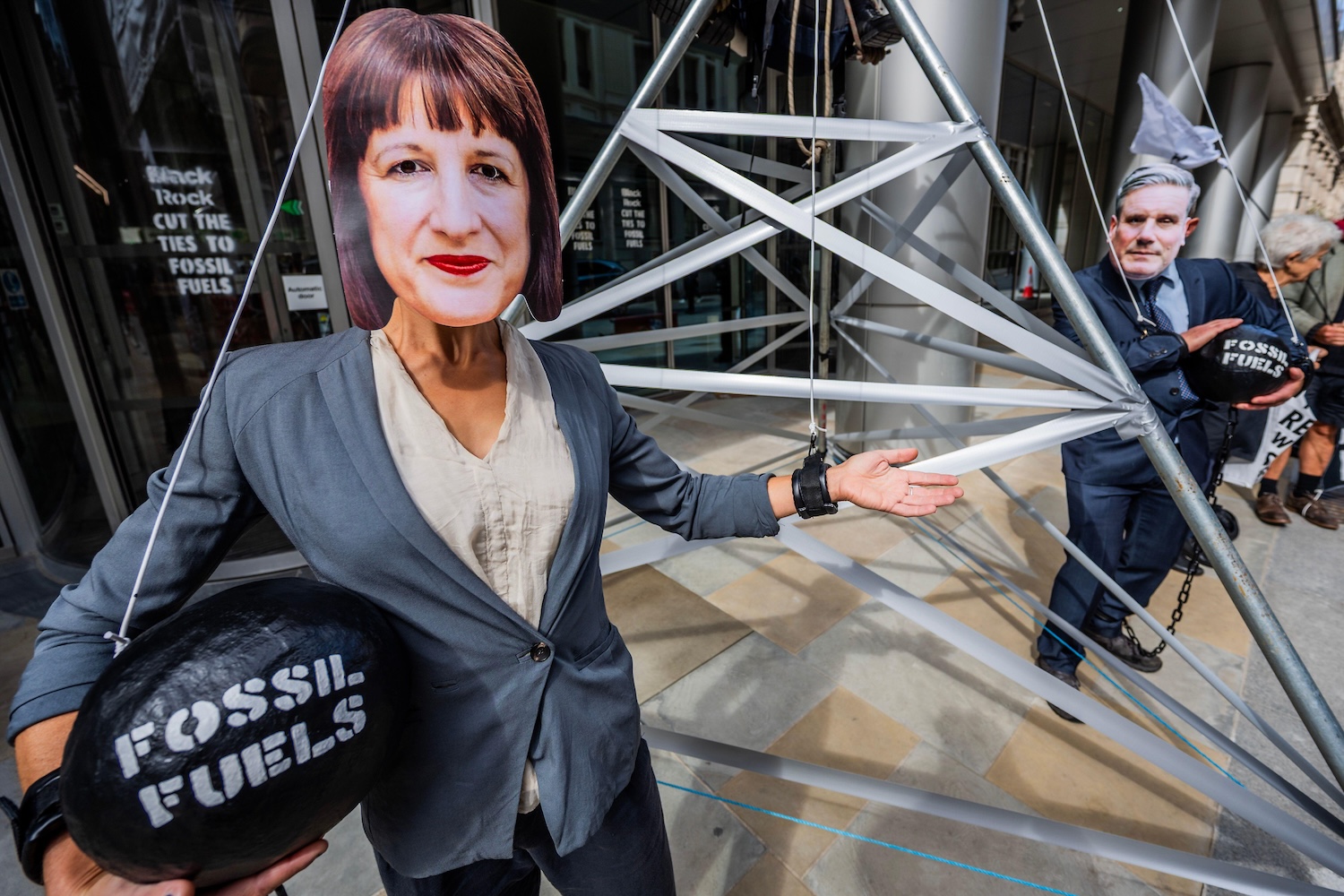
Read our Digital & Print Editions
And support our mission to provide fearless stories about and outside the media system
This week’s budget provides a real opportunity for the UK to adopt an eco-populist approach to consumer energy bills.
This eco-populist energy system would be green, energy independent, secure, efficient, cheap for industry, eliminate fuel poverty and any extra costs would fall on the rich.
Yet how we currently structure energy bills penalises the poor, causes appalling fuel poverty, slows the green transition, is inefficient, dependent on fossil fuel imports, been sold to profiteering billionaires and is really expensive.
For a clean energy system, we need to stop using fossil gas boilers and cookers and close remaining gas power stations as fast as possible.
Therefore electricity prices must be cheaper than gas. Yet insanely successive governments have heaped nearly all of the costs of the green transition, social energy programmes and privatisation profits onto electricity bills, rather than onto taxation and fossil fuels.
The electricity price is now FOUR times higher per unit than gas ( 26.4p versus 6.3p).
The average electricity bill is £900 and gas £850, even though we use far more gas. This is 75% higher than 2020, largely due to gas inflation following the Ukrainian invasion.
A recent parliamentary report found that a staggering 13 million UK households do not turn the heating on due to cost. No wonder the UK suffers a tragic winter elderly death spike compared to other nations.
Most people do not realise that the costs of social energy programmes are not paid for by taxes according to income, but are levied on electricity bills which are not.
What are all these extra levies and costs added to our bills?
The largest is the profit for the privatised electricity and gas national grids and suppliers. The Abu Dhabi and US billionaire owned National Grid plc made £5.3 billion in operating profits and the Australian owned National Gas Transmission plc made £600 million.
This equates to £198 per UK household and Unite just reported that National Grid plc profit margins were an extortionate 38%.
The combined profits of all the privatised parts of the energy market, including the supply and billing corporations are estimated by Unite to be £500 per household.
We also have to pay constraint payments, due to the failure of the National Grid to invest its profits in actually building the national grid and storage needed for the proliferating cheap green electricity providers.
Constraint payments pay providers to turn wind turbines off when the grid does not have the capacity to accept or store abundant production.
These balancing costs are about £53 but may rise to £200 by 2030, if they continue to fail to build the required infrastructure. The investment needed is about ten years of its profits.
The Warm Home Discount provides an inadequate grant of £150 to some low-income households and adds another £22 to bills.
The costs of the ECO home insulation scheme for low-income families to reduce gas heating bills is also paid from electricity bills rather than taxes. It adds £56/household.
A staggering £4.2 billion is now owed by households suffering from fuel poverty. £70 is added to bills to cover these debts. Therefore, the poor are paying to cover the bad debts of other poor people, rather than richer taxpayers.
It gets even more punitive for poorer people paying by standard credit, rather than by the direct debits usually used by the better off. They get charged an extra credit premium of £135 due to higher bad-debt risk.
The Gas Electricity Marginal Pricing subsidy adds another £65/year. This complicated subsidy is paid because UK electricity prices are set 98% of the time by the most expensive electricity which is gas. This despite the fact it only supplies 30% of electricity.
A new nuclear levy of £12/household is being added to cover the insane decision for households to pay the costs and inflation risks of building Sizewell C nuclear power station, rather than for the electricity it may produce in the late 2030s.
The notorious standing charges are an unfair poll tax on poorer households. The combined average for electricity and gas is now £324 before they use ANY energy. This causes poorer people to pay far higher prices per unit than rich high consumers.
Legacy green levies were weirdly added to electricity rather than gas bills. They helped fund the establishment of the wind and solar industries by providing a 20-year guaranteed price for the energy produced.
From 2019 the costs of new solar and wind have been cheaper than gas and this has helped reduce overall costs.
But the costs of the pre-2019 contracts will be paid for up to 14 years more, at a reducing cost each year. These currently add about £110/ year.
There is also an historic Carbon Tax bizarrely on electricity but not on gas! It was successfully used to phase out dirty coal. But it has outlived its purpose, as it discourages the switch from gas heating to electric. It adds about £75 to each electricity bill. VAT at 5% is then levied on both bills, adding about another £83.
ENJOYING THIS ARTICLE? HELP US TO PRODUCE MORE
Receive the monthly Byline Times newspaper and help to support fearless, independent journalism that breaks stories, shapes the agenda and holds power to account.
We’re not funded by a billionaire oligarch or an offshore hedge-fund. We rely on our readers to fund our journalism. If you like what we do, please subscribe.
The Solution
So, how could eco-populism tackle this energy-cost scandal hammering the poor and delaying the transition to a cheap carbon-free energy system?
Tackling the huge privatisation profits is a top priority. If they were moved to the not-for-profit sector, that £500/household could reduce bills for low-income households and ramp up green investment.
Social and legacy green levies should be shifted from bills to general taxation and gas power plants should be removed from the marginal pricing pool.
Standing charges should be abolished and network charges added to unit costs, with an added premium for rich high consumers.
A spokesperson for Zack Polanski’s Green Party told us they favour switching levies to taxation.
They told us: “This shift must help those on low incomes – those with the broadest shoulders must bear the brunt of tax increases, especially the super-rich responsible for the vast majority of carbon emissions.”
We also asked the supposedly populist Reform UK what they would do for energy bills and how much their proposed Tice Green Electricity Tax would add to pensioners bills. But we got no reply.
The billionaire media are flooding the airwaves with attacks on green electricity. They want to maintain our dependence on the billionaire owned fossil fuel markets, when what we need is to build Britain’s affordable green energy independence.
Eco-populism can win for low-income families, for the environment and for Britain.

